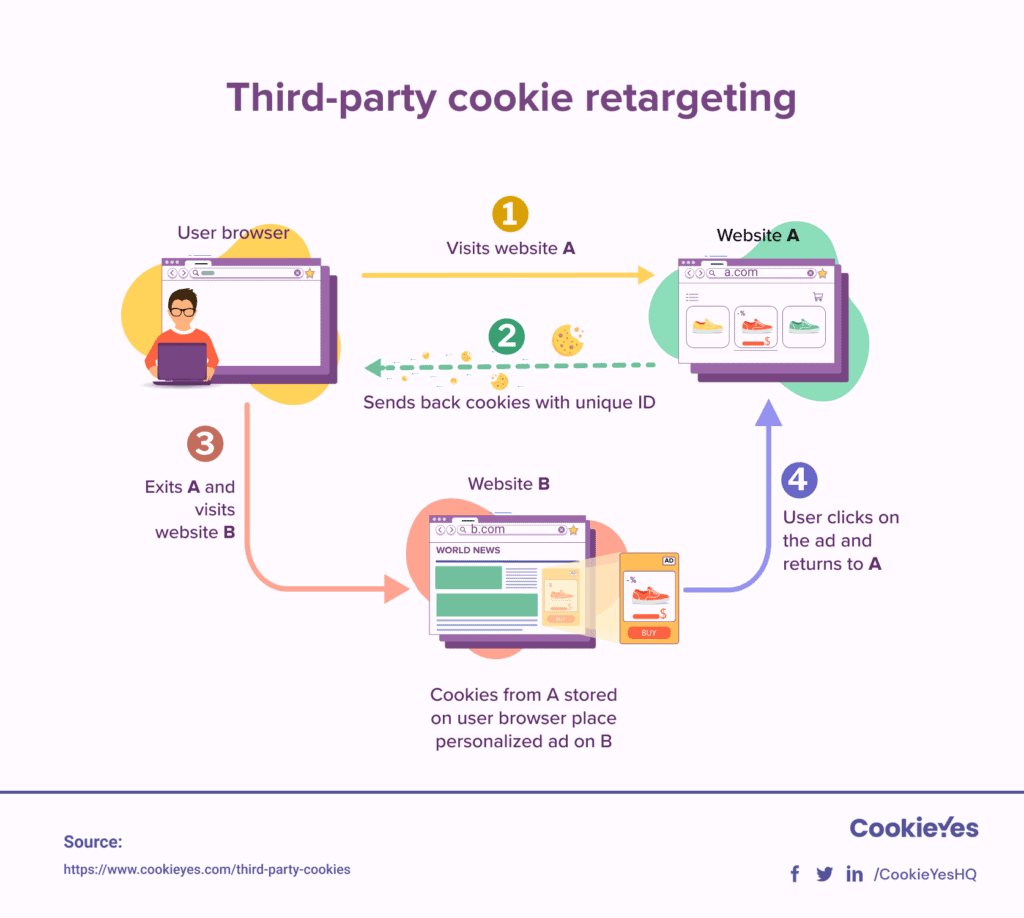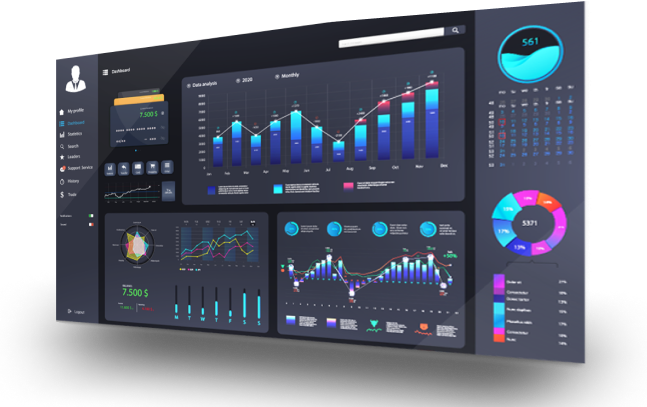Google’s latest announcement that they will be deprecating third party cookies this year is a huge deal when it comes to online marketing. Google Chrome’s phasing out of 3PCs has already begun with 1% of Chrome users now blocking the much maligned cookies. Here are some things you should know about the coming change:
- The end of third-party cookies is coming soon.
- Websites need to start preparing now to avoid disruptions.
- Google’s Privacy Sandbox offers potential solutions for ad targeting and measurement.
- Developers can test Privacy Sandbox APIs in Chrome.
- Stay informed and get involved in the testing process.
- Plan and develop your strategy for a post 3rd party cookie world.
What are Third-party Cookies (3PC)
To put it simply, third-party cookies are cookies set by a domain other than the one the user is currently visiting. These are used primarily for tracking and online advertising purposes. The following is a great diagram of how third party cookies work and are used:

Despite all the negativity surrounding 3PCs, believe it or not there are some benefits to third party cookies:
The Good and the Bad
The Good
- Website Analytics Improvement: They are instrumental in enabling website owners to gain insights into user interactions on their sites, which assists in enhancing site functionality and performance.
- Ad Customization: Advertisers utilize them to tailor advertisements according to a user’s web browsing history, preferences, and demographic details, leading to more relevant ad experiences.
- Enhanced User Interaction: They aid in remembering user settings and login details on websites, contributing to a smoother and more personalized user experience.
The Bad
- Privacy Issues: The use of third-party cookies can lead to extensive personal data collection, including browsing habits, facilitating the creation of comprehensive user profiles.
- Security Concerns: These cookies might be exploited for harmful activities, like tracking users to acquire personal data or disseminating malware.
- Transparency Issues: A significant number of users remain unaware that their online activities are being tracked through third-party cookies, highlighting a transparency issue.
Consequences of the 3PC Demise
I find it interesting that when speaking with most people about their experience navigating the web and being presented with ads, they either complain that they are not at all relevant to them or, conversely, that they get that creepy feeling when a site presents them with ads directly related to an item they were recently investigating. There really is no way to please all the people all the time.
Personally, I don’t mind a “tailored to me” approach to the online experience as it keeps me engaged and presented with things that are of interest to me. However, when it comes to privacy, bad actors have abused the power of 3PCs leading to distrust and paranoia. Chalk it up to the “why we can’t have nice things” department once again.
Here are some potential implications of 3PCs going the way of the Dodo:
- Impact on Ad Targeting and Personalization: Advertisers are set to lose crucial audience data, such as demographics and browsing patterns, impairing their ability to precisely target advertisements.
- Challenges in Tracking User Journey: Marketers will face difficulties in constructing a comprehensive view of user behavior, complicating their understanding of how customers engage with their brand across different channels.
- Increase in First-Party Data Value: The growing importance of first-party data is likely to bolster the dominance of major players like Google and Meta in the advertising market, potentially leading to higher advertising costs and more competition for advertisers.
So what do we do once the third party cookies have been retired?
To me, it will be like going back in time before the mass-adoption of 3PCs led to that creepy “I’m being followed” narrative that has become popular. We need to build more meaningful relationships with our website visitors and customers. Shift your mindset from mass targeting to building meaningful relationships with your audience. By prioritizing first-party data, respecting user privacy, and embracing new technologies, digital marketers can not only survive but thrive in a cookie-less environment. Here are some strategies to focus marketing efforts towards in the post-3PC era:
- Focus on first-party data:
-
- Collect and utilize data from your own channels: This includes website analytics, CRM systems, email engagement, and social media interactions. Building a strong first-party data foundation is crucial for understanding your audience and personalizing campaigns.
- Offer valuable incentives for data collection: Encourage users to share information through gated content, loyalty programs, or personalized experiences. Always be transparent about how their data will be used and respect their privacy choices.
- Invest in customer data platforms (CDPs): These platforms help centralize and organize your first-party data, making it easier to analyze and leverage for insights and targeting.
- Explore alternative targeting methods:
- Contextual targeting: Deliver ads based on the content of a webpage or app, rather than individual users. This aligns your message with relevant topics and interests.
- Cohort marketing: Group users based on shared characteristics or behaviors, enabling you to tailor messaging and offers to specific segments.
- Zero-party data: Collect explicit preferences and interests directly from users through surveys, polls, or interactive quizzes. This provides valuable insights without compromising privacy.
- Embrace privacy-first technologies:
- Leverage cookie-less solutions: Consider platforms like Google’s Privacy Sandbox or identity solutions based on hashed emails or device IDs. These offer limited targeting capabilities but respect user privacy.
- Utilize machine learning and AI: Employ these technologies to analyze first-party data and predict user behavior without relying on individual tracking.
- Prioritize transparency and control: Be upfront about data collection practices and offer users clear options to manage their privacy settings.
- Some More General Strategies:
- Invest in strong analytics: Track campaign performance using a variety of metrics beyond conversions, such as engagement, brand awareness, and sentiment.
- Personalize the customer journey: Deliver relevant content and offers at every touchpoint, regardless of which channel a user interacts with.
- Experiment and adapt: The cookie-less future is still evolving, so be prepared to test new strategies and refine your approach based on results.
If you would like advice and guidance for dealing with marketing in a post third-party cookie world, drop us a line and we’d be happy to help develop, maintain or improve your strategy.










